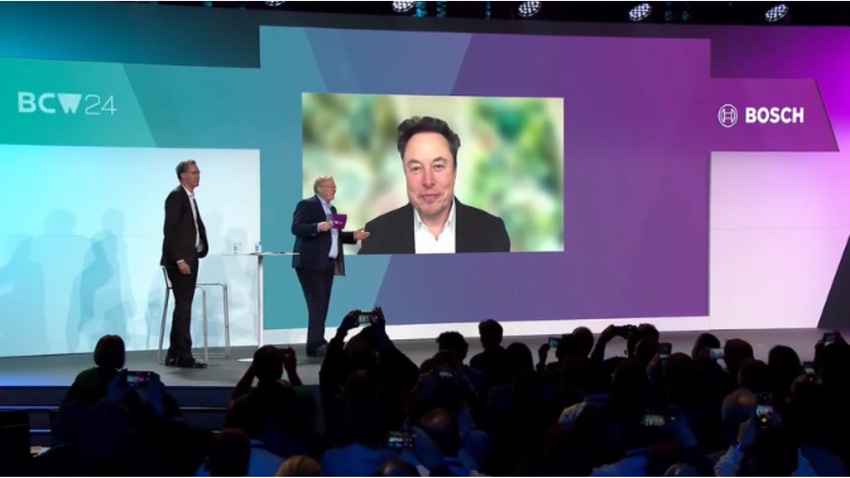Elon Musk on the Future of AI, Self-Driving Cars at Bosch Connected World
In a video Q&A, Musk spoke about the need to ramp up sustainable power generation to meet the rising demands of AI and autonomous vehicles

In a video Q&A closing Bosch’s Connected World conference, Elon Musk gave his predictions for the future of AI and autonomous vehicles (AVs), saying industries are on the edge of the “biggest technology revolution” ever.
“AI is going to profoundly change the world,” he said “One of the most significant ways is in self-driving. We’re putting a lot of effort into self-driving for cars … and I think we’re quite close to having the car fully autonomous.”
The development of fully intelligent vehicles has led to a spike in demand for AI, as well as recent advances in humanoid robotics.
“I've never seen any technology advance faster than [AI compute],” the Tesla CEO said. "The artificial intelligence compute coming online appears to be increasing by a factor of 10 every six months …that cannot continue at such a high rate forever … but I've never seen anything like it.
“The chip rush is bigger than any gold rush that's ever existed.”
Musk highlighted the importance of ramping up sustainable power generation technologies to meet the computational demands of both the blossoming AI and AV markets.
On the topic of self-driving cars Musk said they will have a significant impact on transportation and that they will soon become commonplace, though he added regulatory obstacles and infrastructure demands remain to hamper full-scale adoption.
To facilitate AV growth, Musk said companies need to prioritize the development of voltage step-down transformers and other electric power generators to meet AI’s computational demands and AV power demands.
"The simultaneous growth of electric cars and AI, both of which need electricity, both of which need voltage transformers, is creating a tremendous demand for electrical equipment and for electrical power generation,” Musk said. "The constraints on AI compute are very predictable.
“A year ago, the shortage was chips; neural net chips. Then, it was very easy to predict that the next shortage will be voltage step-down transformers … and the next shortage will be electricity. I think next year you will see that they just can't find enough electricity to run all the chips.”
By facilitating sustainable electricity production, Musk said the industry can remain ahead of these challenges and pave the way for AI’s continued growth.
This story first appeared in sister publication IoT World Today. To stay updated on all things IoT, subscribe to their newsletter.
About the Author(s)
You May Also Like


.jpg?width=700&auto=webp&quality=80&disable=upscale)
.jpg?width=700&auto=webp&quality=80&disable=upscale)
.jpg?width=700&auto=webp&quality=80&disable=upscale)
.jpg?width=300&auto=webp&quality=80&disable=upscale)
.jpg?width=300&auto=webp&quality=80&disable=upscale)
.jpg?width=300&auto=webp&quality=80&disable=upscale)
.jpg?width=300&auto=webp&quality=80&disable=upscale)
.jpg?width=300&auto=webp&quality=80&disable=upscale)